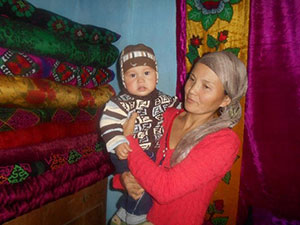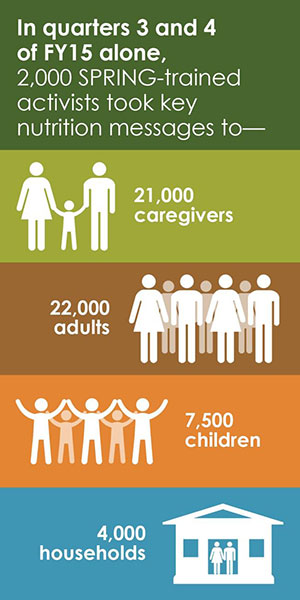
Seitova Raima lives in Isar village, located in Kyrgyzstan’s rural Ala-Buka rayon, which has a population of 1,900 people, most of whom farm and raise livestock. Although Isar has one health post with two nurses, mothers of young children are usually too busy with routine work to visit the post for health checkups and medical advice. Therefore, many mothers in this community have never received information and counselling on proper child feeding and nutrition.

Recognizing this knowledge gap, in June 2015, SPRING provided training in infant and young child feeding to an existing network of local community activists. The activists, who range from school teachers to housewives to government leaders, then visited all households with children under two years of age to disseminate key messages about the importance of exclusive breastfeeding and provide a nutrition booklet developed by SPRING and the Ministry of Health.
On the day following the training, an activist named Omurbaeva Gilnara visited Seitova Raima’s house and spent 30 minutes introducing the booklet and talking about exclusive breastfeeding. At the time of the visit, Raima’s son was four months old and was being given foods other than breastmilk. After learning that only breastmilk for the baby’s first six months is the best choice for optimal nutrition, and after being reassured that her breastmilk alone was sufficient for her baby, Raima gained the confidence to exclusively breastfeed.
When her son reached six months of age, Raima began feeding him other healthy foods in addition to breastmilk, as is recommended. Though the boy was Raima’s third child, she had never heard about the benefits of exclusive breastfeeding. Raima was grateful to receive this information, as well as the booklet containing additional recommended nutrition and feeding practices for young children.
SPRING’s outreach to Raima was part of a larger social and behavior change communication strategy that provides orientation on nutrition topics to 2,000 activists monthly. From April to September of 2015, the work of these activists reached over 21,000 caregivers and 7,500 children under two from 4,000 households. From July to September, community meetings brought key nutrition messages to an additional 10,000 adults.
Raima is just one example of how community-level behavior change programming is improving the health practices and lives of mothers and children in rural areas of the Kyrgyz Republic.